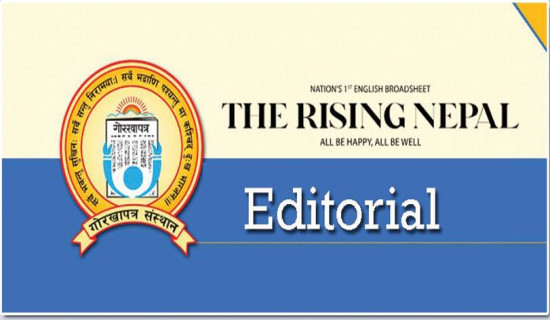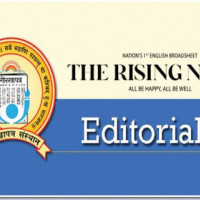- Sunday, 25 January 2026
Coalition's Roadmap
The five-party ruling coalition of the government has come up with its common document that seeks to rekindle citizens’ hope and instil their confidence in the state institutions. The Minimum Policy Priority and Common Resolution, made public on Tuesday, has prioritised good governance, development and prosperity. This is a pragmatic commitment based on the principal thrust of government objectives. Every political party operating under the existing constitutional framework shares this vision of development. The new alliance came into existence by replacing the Nepali Congress by CPN-UML as a key partner. The common minimum resolution will keep the ruling coalition partners in a unified and unambiguous fold regarding the performance of the government for public deliveries. However, actions speak louder than words, and only putting the pledges into action can win the hearts and minds of the people who are grappling with grievances on many sectors of life.
Against this backdrop, the new administration is poised to boost public trust in its competency, credibility and efficiency in governing the nation till the next elections. Accordingly, it has set 13 priorities encompassing a wide area of governance that includes clean administration, access to employment, education, health and social security, development of energy, economic revival and foreign policy. Based on seven-point agreement reached between the five parties, the common resolution reflects the coalition's approach to the handling of issues of public importance. The country is currently coping with various economic challenges such as low capital spending, poor revenue collection, delays in the execution of major infrastructure projects, flight of valuable workforce and capital, and chronic unemployment.
Policy intervention has been sought to give a fillip to the flagging economy. To overcome slow credit disbursement and low development expenditure, the resolution has stressed coordinating fiscal and monetary policy, revising various laws to attract short-term and medium-term investment and carry employment-friendly policy reforms. It has recommended sustainable management of public finance, revenue sector reform, frugality in adm-inistrative works, identification and mobilisation of new sources of foreign aid to increase the revenues. The coalition has put its best foot forward to build a respectable middle-income economy by giving emphasis on digitisation, tourism, agriculture, energy and green industries vital for economic growth and structural transformation.
To enhance entrepreneurship and domestic production, the government has unveiled new concepts of 'Make in Nepal and Made in Nepal.' For this, Employment Bank, Start-up Trust and Business Equation Centre will be set up. These initiatives are necessary to develop import-substitution industries. Priority has been given to sort out the problems associated with cooperatives, micro-finance institutions and unfair transactions by rescheduling and restructuring loans of microfinance borrowers. Those involved in agro-based industries will receive subsidy schemes and loans. The country has completed two election cycles since the adoption of federalism but in the absence of required laws, problems still persist in implementing it. So the resolution is for enactment of laws so that three-tier governments work effectively and the inclusive democracy is truly functional.
As Nepal is located in a sensitive geography, it should tread cautiously when it comes to dealing with neighbours, friendly nations and global agencies. It is only with the neutral and non-aligned foreign policy that Nepal can protect its national interest, sovereignty, territorial integrity and dignity. The resolution has rightly emphasised to follow neutral foreign policy in addition to making effective diplomatic efforts to take back the encroached territories in Lipmiyadhura, Lipulek, Kalapani and Susta, and manage border. The coalition partners should work in close coordination to implement their common programmes so that they bring a positive change in the life of ordinary people.














-original-thumb.jpg)


